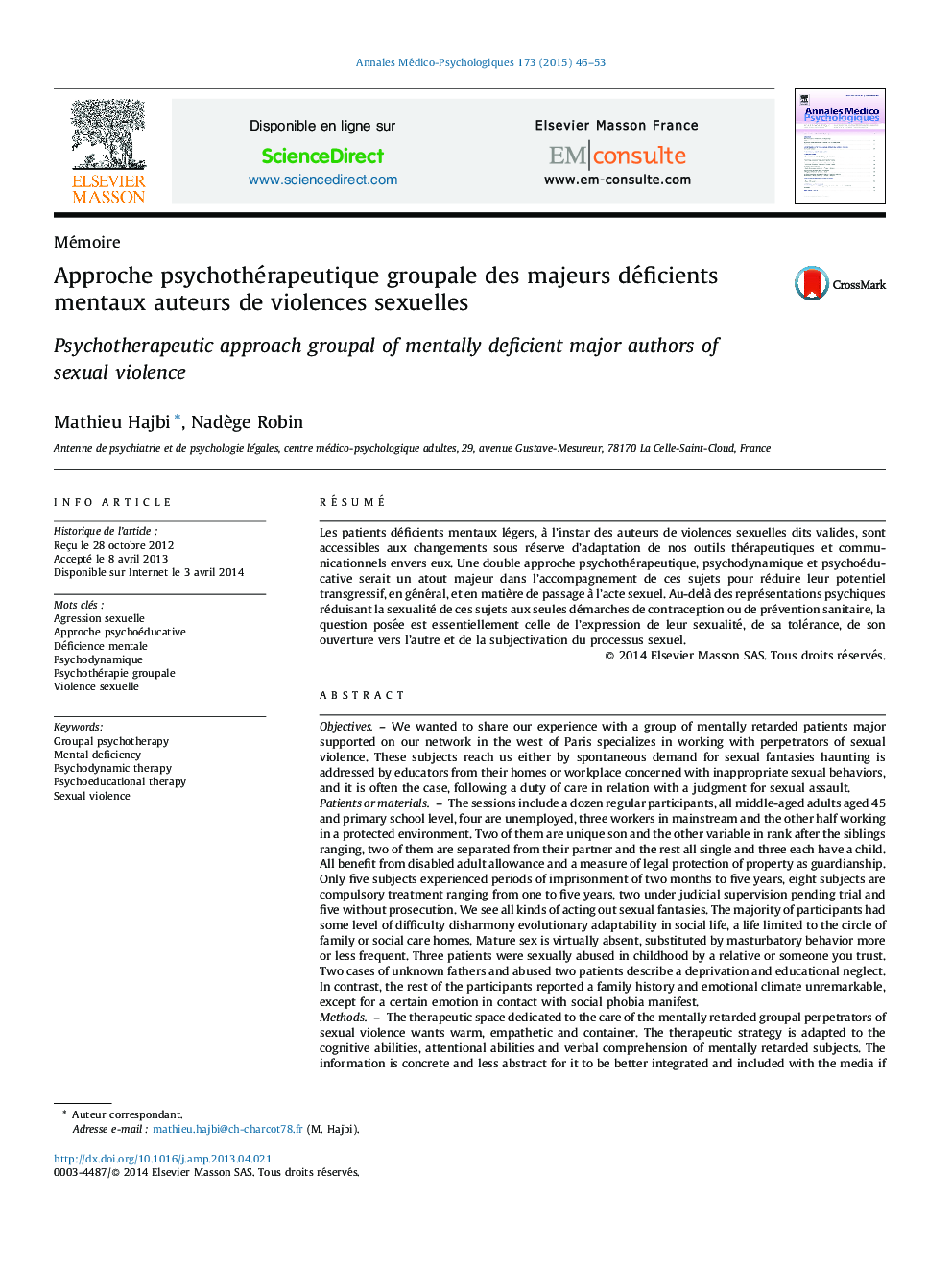| کد مقاله | کد نشریه | سال انتشار | مقاله انگلیسی | نسخه تمام متن |
|---|---|---|---|---|
| 314755 | 534745 | 2015 | 8 صفحه PDF | دانلود رایگان |

RésuméLes patients déficients mentaux légers, à l’instar des auteurs de violences sexuelles dits valides, sont accessibles aux changements sous réserve d’adaptation de nos outils thérapeutiques et communicationnels envers eux. Une double approche psychothérapeutique, psychodynamique et psychoéducative serait un atout majeur dans l’accompagnement de ces sujets pour réduire leur potentiel transgressif, en général, et en matière de passage à l’acte sexuel. Au-delà des représentations psychiques réduisant la sexualité de ces sujets aux seules démarches de contraception ou de prévention sanitaire, la question posée est essentiellement celle de l’expression de leur sexualité, de sa tolérance, de son ouverture vers l’autre et de la subjectivation du processus sexuel.
ObjectivesWe wanted to share our experience with a group of mentally retarded patients major supported on our network in the west of Paris specializes in working with perpetrators of sexual violence. These subjects reach us either by spontaneous demand for sexual fantasies haunting is addressed by educators from their homes or workplace concerned with inappropriate sexual behaviors, and it is often the case, following a duty of care in relation with a judgment for sexual assault.Patients or materialsThe sessions include a dozen regular participants, all middle-aged adults aged 45 and primary school level, four are unemployed, three workers in mainstream and the other half working in a protected environment. Two of them are unique son and the other variable in rank after the siblings ranging, two of them are separated from their partner and the rest all single and three each have a child. All benefit from disabled adult allowance and a measure of legal protection of property as guardianship. Only five subjects experienced periods of imprisonment of two months to five years, eight subjects are compulsory treatment ranging from one to five years, two under judicial supervision pending trial and five without prosecution. We see all kinds of acting out sexual fantasies. The majority of participants had some level of difficulty disharmony evolutionary adaptability in social life, a life limited to the circle of family or social care homes. Mature sex is virtually absent, substituted by masturbatory behavior more or less frequent. Three patients were sexually abused in childhood by a relative or someone you trust. Two cases of unknown fathers and abused two patients describe a deprivation and educational neglect. In contrast, the rest of the participants reported a family history and emotional climate unremarkable, except for a certain emotion in contact with social phobia manifest.MethodsThe therapeutic space dedicated to the care of the mentally retarded groupal perpetrators of sexual violence wants warm, empathetic and container. The therapeutic strategy is adapted to the cognitive abilities, attentional abilities and verbal comprehension of mentally retarded subjects. The information is concrete and less abstract for it to be better integrated and included with the media if required (drawings, anatomical charts, photos, mediated by educational tools such as “that told” and/or other equipment specially designed as our “Scale degrees of physical intimacy” [Nadège Robin, Hajbi Mathieu, France 2011]). Overall, the therapists involved in the critical exchanges between participants where lighting is required with a double approach: psychodynamic and psychoeducational. The psychodynamic approach is referred cathartic, introspective, inspirational affects overdue, projective identifications and fantasies in relation to object choice; whereas psychoeducational approach is for preventive strengthening the knowledge, expertise, knowledge being and impulse control… it is based, in turn, on educational explanations. Several levels of change are well appreciated in ascending chronological order (degree of recognition, Identification of risk situations, self-perceived psychological strategies of change), but their temporal stability is a key factor for ensuring a real capacity for change. Overall, the changes in the total population varies depending on the duration and quality sharing arrangement of the therapy and the level of involvement and intellectualization of each patient.ResultsWe can highlight some difficulties, namely the search for sexual activity shared, lack of information about sexuality, lack of anticipation, representation, abstraction, verbalisation and inhibition of impulses. Therapeutic strategy to adopt is to put these subjects to control their sexual urges, direct their sexual desires appropriately and improve their ability to create interpersonal sexual, emotional and granted.ConclusionsMentally deficient patients are accessible to light changes subject to adapt our tools and our therapeutic communication to their cognitive abilities. The question is essentially the expression of their sexuality, tolerance, openness to others and the subjectivation process of creating sexual relationships, romantic and consensual sex. The specific psychotherapeutic approach that we developed, too rare, is an asset to progress in the psychoeducational support of these subjects in an attempt to reduce the potential for transgressive transition to sexual intercourse.
Journal: Annales Médico-psychologiques, revue psychiatrique - Volume 173, Issue 1, February 2015, Pages 46–53